

“ASYUT CITY, all passengers ASYUT please to disembark! ASYUT CITY, all passengers. Those gentlemens and ladies continuing upon LUXOR CITY and INFIDEL KARNAK TEMPLE, wait in station please and board the train in...”
The conductor rapped on Carter’s compartment and then passed on, still calling out.
“What a nuisance!” Carter thought. “Egyptians had to “clean” the train. It was totally unnecessary to sweep them from end to end. Sweepers raised more dust than they got rid of, everybody knew that!” But there was nothing for it, the sweepers which all belonged to some kind of hereditary guild or proprietary "hanseatic" league of cleaners had to make a living too, and so he had to go. Carter took a deep breath, dropped the last page of his paper to the floor, then rose. With a yawn and a stretch, he was ready to exit. He reached for his hat in the rack above his seat, then withdrew his hand hastily.
He had just stepped out of his compartment onto the platform when his eye caught something at his shoe tip. A discarded cigarette tin, he was about to give it a kick when he saw it was still sealed. He picked it up. A full tin, he thought. That was unusual.
Unfortunately, Egyptian “Turkish” cigarettes were hardly worth the few pennies they cost, for the best Egyptian tobacco was shipped direct to England for processing. It was sent back at higher cost to Egypt as “Prince Albert’s Fine Turkish Tobaccos” or other well-known imported brands. This native brand was what the poor local people all smoked--to the ruination of livers. Once he had tried it--once! He accepted a cigarette from Mehmet and...it took a week to get rid of the taste of petrol, civet, moldy hemp sacking, and spoilt sardines that was concentrated like all the fiends of hell in that one, horrific puff.
About to give the unwelcome tin a fling into the hands of a passing porter who would be glad of the chance to ruin his organs, he paused. Just then as Miss Peckham and her evil-eyed companion passed by. They both glanced pointedly at his tin.
Miss Peckham took a step toward him. “I really think, Mr. Carter, you would benefit by turning thoughts away from vice and self-aggrandizement to the needs of your immortal soul.” She was holding out a slip of printed material.
“What now?” Carter replied. “Not an evangelical gospel tract, surely. I have no need of such things, if that is what it is. It’s against the law here, you know. I could have you arrested.”
Miss Peckham was not one to give up easily on so clearly a doomed soul as Mr. Carter. “Please read it, sir,” she continued, tucking it in his vest pocket in a quick movement. “You won’t regret giving it a moment of your time. I can assure you that.”
Mr. Carter looked about, but for once no Egyptian militiamen were visible.
The women stepped away, and Carter was left staring at the paper, with the message he expected, proclaiming in simple English that he was lost to eternal fires unless he repented of his sins and confessed them to the Lord Jesus Christ, Savior of the World. There was even a crude portrayal of a lost soul writhing amidst hell-flame, tormented by fiends, along with the caption: “ Oh, if I had only listened to the call of God instead of Satan and the Alluring World!”

The women gone, turning back to the matter at hand, the tin’s gaudy gilt decoration caught his eye.
His mouth fell open. There was no question about it, the crowned Sphinx had his own face! And the name! The tin read “Carter’s Royal Sphinx Turkish Cigarettes” with the caption at the bottom, "Price: Your Immortal Soul"!
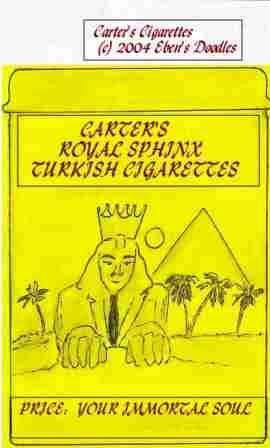
But something was added. He held the tin close to his eye and saw a shaft was pictured, opened up at the same spot on the Sphinx’s flank where he had just dug! Beads of cold and hot alike tumbled off Carter’s brow to the ground. He didn’t know what to do for a moment. Faint, he looked about, seeing only blurs where crowds milled about on the busy station platform or boarded the train.
Then he heard the whistle blasting and saw the train was moving. Grasping the tin, Carter swung back onboard just as the Second Class compartments were passing him. A moment later, he was inside, sharing the journey with a triad of Birmingham-trained, uncomfortable Egyptian railway bridge engineers in European business suit and tie. The only thing that he could be glad of was that they weren’t British mission females with an animus for archaeologists!
The return trip to Cairo was a torment of “tarrying,” but Carter wasn’t feeling like conversation anyway. Only one engineer had the temerity to approach him. “Sir, are not you the--”
“Egad! Who not?” Carter burst out, squelching the fellow’s feeble attempt.
After that, a strained silence reigned in the compartment that was every bit as uncomfortable as the previous one. The conductor was, of course, very surprised to see his famed passenger back on board.
“I received a wire to return at once to the Museum,” Carter said casually. “Can’t be helped! As for the ticket, I hadn’t time to get one. I’m sure you understand my predicament.” He held out the fare, plus a generous tip.
“By nonetheless, Mr. Carter, please to be onboard! But would you like First Class better? We have room available and you would be among your own kind.”
Carter shook his head--he wasn’t about to risk another Miss Peckham--or was it Burnham?--who wasn’t exactly his “own kind.” The accommodating conductor took the money, bowed, and left.
Hours later, the train huffed to a halt at the vast Cairo station and was swept with waves of humanity. Carter threw himself into the sea of bodies and found a motor cab, a fine Packard Touring Car, outside the pillared entrance. He knew he must be nearing his destination when he smelled an unmistakable blend of civet, hemp, sardines, and petrol.
Abdel Hamid Hassan and Sons’ Fine Rolled Turkish Tobaccos, the same that produced the brand Carter still had in his coat pocket, was a nondescript warehouse-factory like dozens of others that spilled over from the city into the suburb of Ain Shan, anciently known as Heliopolis. It was late in the day, but oriental establishments were never good at keeping exact office hours, so Carter found Mr. Hassan on duty.
Egyptian courtesy is careless of time and elaborate, especially with prospective European customers, but Carter had no time for peppermint tea and the other amenities. He stormed past the startled clerks at the front counter and made for the door gilded with the owner’s name and “Inquiries and Orders, Factory and European Shop.” Holding the tin out, Carter nearly thrust it in Mr. Hassan’s face, but instead accepted the chair offered.
“You wish to buy many dozens of those, sir?” began the smiling, gray-haired gentleman doubtfully, after seating himself behind an ornately-carved teakwood desk. “Surely, you might prefer some shipments of our cigars instead, fit for a gentlemen such as yourselves.”
Carter could not contain himself any longer. “What’s the meaning of this?” He again held out the offending tin.
Mr. Hassan’s face showed some surprise and confusion. “What do you wish here?” he began again. “Is it a refill of the tin you wish, sir? Surely--”
“No, I haven’t come to buy any of your liver-rot. You put my name and face on your company tin, and I want it taken off immediately. Immediately, do you hear? This is an outrage! I’ll see the Consul if I have to!”
Mr. Hassan was even more confused. “But what is wrong? It is always the Sphinx we carry on our fine tobacco. My honorable grandfather gave it to my father, and he gave it to me, so we change nothing here. Nothing!”
Carter was astounded. “What, do you mean to deny you put my name and face on your tin?” He glanced at the item in question, and that was his undoing. He saw only a Sphinx--no crown, no Carter name. Flipping it over, he saw only the Pyramids of Giza pictured against a lurid Oriental sunset.
Carter’s face flushed beet red despite his weathered tan. He rose, dropping the tin onto the Turkish carpet, and his hands rose to his bowtie. A moment or two later, he was back in the street, the cabby gazing at him with concern. Aware people were stopping to stare at him, Carter escaped into the cab.
When he recovered his thoughts sufficiently, he decided he should treat the whole incident as though it had not happened. It was best to pick up where he left off. Put on a good, stiff lip. “City station!” he ordered the cabby. “Quickly!”
On the way, Carter deliberately kept his eyes lowered, without a single glance toward Giza. Stopped in clogged traffic, the venders of various nut and honey sweetmeats and jasmine-scented soaps and other clap-trap reached in through the window with their wares, but even then Carter did not stir to ward them off.
The cab made little progress, moving a few feet, then halting, again and again. Carter felt terrible, hot and cold at the same time. When he was sure he wouldn’t see a pyramid, he looked out, and his blood drained from his face. In the next car to the side, a rather fine Rolls, Lady Evelyn and Theodore Davis sat. His stare caused them to turn his way. Carter’s mouth fell open. What could he do?
The traffic started again, and his vehicle parted from Lady Evelyn and Theodore Davis’s. His cab fell back, however, and Lady Evelyn and Theodore Davis shot ahead.
“No!” Carter cried to the cabby. “Don’t let them get away. After them, you fool!” It took a good deal more yelling before the cabby really understood. He made a valiant attempt, and the cab dashed like a runaway horse between slower vehicles and camels and flocks of sheep.
What was Carter seeing loom ahead of the two speeding cars? The Pyramids of Giza!
“Fool, don't you see the other car is getting away? Turn around, go the other way, back to the station!” he shouted at the poor cabby.
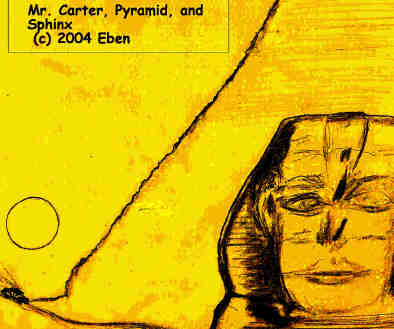
They just pulled up when Carter saw Lady Evelyn and Theodore Davis step out of a cab and stand, looking toward him expectantly, as if a meeting had been arranged. Determined to take their dare, Carter jumped from the still moving cab. But the moment his feet hit the pavement, the two stepped into a cab and were off. The goose chase again took them all back to Giza.
Carter couldn’t swallow that, so he ordered another return trip to the station. By this time, the cabby--used to the vagaries and whims of rich, eccentric Britons--was beside himself. He had never been so tested and was growing afraid for his life. The cabby slowed to a stop, for the man wanted to get rid of this disconcerting foreigner.
Carter knew somehow what the cabby intended. He let the man get out and open the door. Quickly, Carter slipped around and into the driver’s seat. His foot rammed on the footfeed, the car vaulted off down the street, promising to hit every fruit stand and stray dog as the vehicle careened from side to side. Behind ran the wailing, gesticulating cabby. Carter reached the station and prepared to abandon the vehicle and board a train immediately.
He was getting out when he again saw the fateful pair staring at him from another cab. This time, Carter was prepared, and he ignored them. He went into the station and purchased a ticket and boarded the first train to Asyut-Luxor.
Later, reaching Asyut without incident, he disembarked so the train could be swept just as dirty as it arrived, only to see Lady Evelyn and Theodore Davis on the platform. Jumping back on the train, he mistakenly entered a nuns’ compartment. That wouldn’t do, so he again disembarked, to face the murdered. They saw him and moved toward him. “No, you don’t!” he thought, having changed his mind about a confrontation in front of so many people. Scattering some crouched men on board the vacated train, Carter held his ground in a compartment until they left, muttering oaths concerning infidel foreigners.
The dust was heavy in the air, and he gagged. He didn’t dare open the window, however. He hadn’t the nerve to look out.
Finally, people streamed back to regain their seats. The whistle blew, the train lurched, and they were off to Luxor.
Feeling more himself as the moments passed, Carter relaxed a fraction and reached for a cigar. He found one, then paused to remove the paper seal. But his fingers froze. His eye caught the decoration--clearly Lady Evelyn and Theodore Davis! Carter flew to the window, flung it open, and the cigar went sailing toward the River and struck a lazing crocodile--one of the few left in the area.
They reached Luxor without further incident. But at the station Carter was about to disembark when he spied Lord Carnarvon, standing on the platform with Theodore Davis, and with them was the Egyptian chief of police. Carter’s heart stopped. The worst was known! Somehow they had escaped being buried alive, everybody knew what he had done, and he was going to be arrested and disgraced before the whole world. “I’m ruined, utterly ruined!” the man thought.
He couldn’t make himself get off the train. Oddly, he continued to sit where he was and no one came on to remove him. The train moved on, southward, toward Nubia and the Sudan. At the next stop, the desperate man got off and boarded another train going north. Despite the danger of being arrested, he had no desire to escape into the wilds of the Sahara, to perish there of heat and thirst like an animal. Better a hanging or prison for life, then a death like that, he reasoned.
The train eventually pulled in at Luxor and Carter tried to get off. But it was impossible. Again, Lord Carnarvon, Lady Evelyn, Theodore Davis, and a host of local militia stood waiting for him. He continued on, therefore, back to Cairo. Exhausted, his nerves frayed to the snapping point, Carter had no plan, no idea what to do. He only wanted to escape, like any hunted, hounded animal.
But he was afforded no such luxury. Lady Evelyn and Theodore Davis were waiting for him at the Cairo station. He saw them everywhere he turned. Fleeing them on foot and sometimes by cab, he always found himself back at Giza. “Not again! Not again!” he shrieked, careless of who heard him, as the cab stopped and the first people he saw were the phantom pair.
What a nightmare! He was utterly spent by this time, his clothes soaked with perspiration and streaked with dust. Was it night or day? He could no longer tell, because whether day or night it made no difference in his condition. Mirroring his mind’s confused muddle, a most dismal dusk had seized on the landscape, blurring the outlines of things so that nothing was familiar, everything looked strange and foreboding--a phantasmagoria which he seemingly could not escape.
A chill wind off the desert made him shudder uncontrollably. He couldn’t find money for the fare, and the cabby began yelling and gesturing. A crowd soon gathered round, taking the cabby’s part. He tried to reboard the cab, but the cabby and his helpers prevented him every time he tried it.
Finally, they left him. No one would help him get away from Giza. He would have to walk. But as he started, the phantoms pulled alongside in a vehicle and accompanied him.
Carter broke away, running back toward Giza. To run faster he tore off his coat and flung it. His bow tie and shirt were next. One shoe came off and he didn’t stop to retrieve it. He lost a stocking and garter too. The phantom car was catching up. As he ran he could hear it close behind.
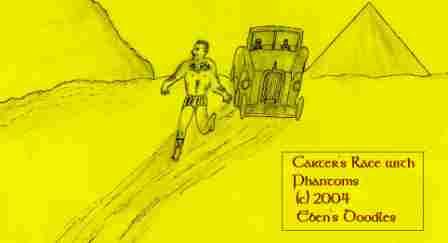
“I can’t release you!” he cried out when he got his breath. “You’ll rot there forever! Why do you have to torment me! You brought it on yourselves, don’t you see? You forced me to do it!”
No, apparently, they did not see it that way. The phantoms continued to dog his steps, until he had fled all the way round the Sphinx. In the lunatic race he lost his trousers and remaining shoe. He was as good as stripped naked, only his striped briefs and one garter left to cover himself.
In that miserable, broken, shameful state, he trudged back into the city on bare feet, drawing stares because of his European skin and unparalleled nudity, though many naked native beggars infested the environs of the city. Yet when he reached the station, his tormentors suddenly vanished.
He had no money and certainly wasn’t properly dressed, so he had to seek asylum at the nearby Museum before police arrested him for indecent exposure. There was nothing he could say to adequately explain his condition to the mortified, astonished staff, of course. He declared that he had been robbed, set upon and stripped of money and clothes, and no more was asked.
Embarrassed beyond words, Carter accepted a suit though it was too small for his European frame, and enough money to see him to Luxor, and took leave with as much dignity as he could muster.
“I refuse to play their game any longer!” he thought, as he rode back to Luxor. “If I won’t play, then they have no power over me. That’s the nature of these hallucinations and brain fever phantasms. Give them an inch, they gobble a mile!” That seemed a sensible piece of strategy in the circumstances, and he stuck with it the next time they appeared--which they did, on the Luxor platform. Even Lord Carnarvon was with them, as before, but Carter strode straight past, chin up, as though the earl were mist and vapor.
Lord Carnarvon’s voice carried, however, and Carter heard him calling.
“I say, Carter, don’t hurry off like that? Can’t you see me?”
Carter turned round.
Shaking his head, the frail earl struggled through the usual clots of extended families, all laden with baggage and miscellaneous chickens and sheep. The men shook hands on joining company.
“I was concerned when you didn’t arrive with Her Majesty’s entourage,” said the earl. “I had to think of some reason you were detained. She is still waiting for you, thank heaven! A day more, and I doubt I could have held her for all the treasure of Tutankhamun. Now, dear boy, you must go at once to see her. She is staying at the Winter Palace. I turned it entirely over to her and her people. But where is my dear daughter? I wasn’t feeling up to it, so she went without me. She was going to Alexandria to greet the queen, then she didn’t come back with her. Nobody has seen her. I am so dreadfully worried. This country isn’t as safe as it might be--being so far out east and oriental, you know. Oh, I forgot, I’ve reserved a suite at Karnak Imperial Hotel--not much of a lodgings for a gentleman, to be sure, but I trust you will make do there. As for me, I’m going to Alexandria. I simply must go find little Evie! Oh, I was shaving and cut myself nastily on a mosquito bite. Is it serious? I feel a slight inflammation, but haven’t time to get it treated. Besides, the doctors are the native sort here, better at soothsaying and applying dung poultices to sick sheep and donkeys. I fear they’d just make it worse if they tend to it!”
Carter faced his old patron as best he could after his trying experiences. “How strange she should not be here with you as she planned! I understand your fears, but surely she will be coming shortly, maybe by the next train. Yours may be a wasted trip. But if you think it best to go, then godspeed! Well, I must go to see the queen now, I expect. But first I must freshen up and change clothes.”
Lord Carnarvon, his anxious father’s concern still showing for his detained daughter, took preoccupied leave of the famed archaeologist. Carter, after the train moved off with the earl, turned. No phantoms or absurd Egyptian “djinni” to prevent him, he walked away and got on with his life, having “cut his losses” and consolidated his gains.
It wasn’t long after that that Mehmet had his accident--falling off a raft to his doom. Native folk claimed his mournful spirit haunted the riverbank nearest his drowning long years afterwards. It was a common tale for such mishaps.
The “Curse of the Pharaohs”? You could carry such a thing only so far. Lord Carnarvon’s sudden death, his daughter’s disappearance, Theodore Davis’s disappearance, Mehmet’s drowning (though the death of a supervisor was not thought especially auspicious, since he was native), certainly could point to the efficacy of the ancient curses that guarded every pharaoh’s tomb against violation. But as it turned out, of all the principal actors in the Tutankhamun drama, Harold Carter survived into his sunset years, long enough to write three volumes of memoirs and finish his secret diary.
If Carter bore a deadly curse, he certainly carried it like a gentleman. True, the whiz and bang of the “Red Mystery Light” no longer led him to spectacular finds. Without its spontaneous pyrotechnics, life for Carter devolved to something predictable and sedate--a quiet London club and a cozy flat stuffed with memorabilia of his Tutankhamun days, not to mention a veritable raft of honorary doctorates from British and American universities that he had framed in gold and hung on the walls
To keep his limbs from stiffening too much he went on long walks in a nearby park. Only once did he see a young woman in the company of an elderly man whom he thought he knew--but he paid no heed to the specters and nothing more came of the late, fading encounter.
Growing too arthritic to walk, Carter had his man-servant drive him through the parks on days when the weather permitted.
On one such occasion, the driver helped the old man up to his place, then got out to go round to the driver’s side. As he opened the door, a terrific fire burst out in the back where Carter was seated. The driver rushed to get Carter out, but the flames were too violent and he could do nothing but run and call for help.
By the time he returned a minute later crowds were thronging the car, despite the danger of the petrol tank blowing up. “By St Cuthburt’s caboodle, ‘e’s burnt like a faggot on a bonfire!” a lanky Cockney woman cried, jumping up and down in horror and helplessness. “Po’, po’ ol’ gen’l’mun, to croak so ofally like that! Oh! Tar’ble! Tar’ble!” Her companion, an older lady, could only mumble over and over "Lord, have mercy!"
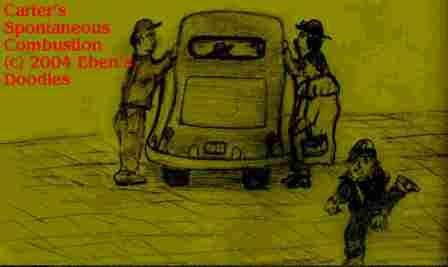
Scotland Yard detectives arrived, and though too professional to show it, they, among them a Frank Sinatra look-alike by the name of Sir Cedric Kentwood, were mystified.
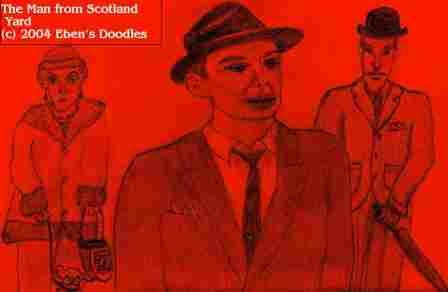
Apparently out of thin air a torch-like conflagration had burst upon him, utterly consuming his viscera but leaving his fine Fleet Street suit and clothes, shoes, stockings, and garters, not to mention cane, spectacles, gloves, money purse, and bow tie, not to mention his Fleet Street bowler, intact.
Of course, they were all a bit smudged up, but that was the only sign that something out of the ordinary had occurred. Another combustion case to be solved by Scotland Yard and its hundred years or more of expert case work? Never, under their auspices.
Rather, the case would have to await the brilliant detection services of a Miss Elizabeth Pugh, a "sleuth in petticoats. But that wouldn't come about until decades had passed and Carter's great fame had all but faded into thin air in the musty archives of the library of the Bodleian and the British Museum.


Though it was difficult with one hand, she loosened his tie and cravat and wanted water to give him, but, of course, there was none to be had. A dreadful time passed, while the old man gasped for breath, but his condition grew no worse and his erratic, galloping pulse gradually slowed. “I’m quite all right!” the old man whispered hoarsely. “You’re fussing over me for nothing. I just need to rest a bit and then I’ll be hopping to my feet, good as new. A pity there’s nothing to drink down here. I could do with a little pick-me-up right now, you know. ”
Lady Evelyn managed to give a nice, bright, reassuring smile, though the effect was totally lost in the gloom. Yet hoping the present crisis was over and his next might be hours away, Lady Evelyn stole a moment away from her patient to go to the door. It was shut drum-tight. A bank vault couldn’t have managed it better. Was there anything she could use to pry it open? she wondered, looking about. She moved about, then her foot struck something. Carefully, she nudged it again and felt sure it was metal, solid, and her missing revolver. Yes! She picked it up carefully, then stood considering what effect it might have if she were to fire it at the stone slab door.
Nothing! she concluded dismally. It would take several cannons to make a dent.
She turned away, her eyes searching the gloom and silently cursing the Ancient Egyptians for being such wonderful stonemasons. She knew she had little time to devise a way out. Davis needed medical attention, at a hospital, if he were to survive another attack. So she had to get him out soon, or he had no chance of surviving. If only she had insisted he send someone in his place, but he wouldn’t hear it. Now she knew it had been a mistake to tell him what she knew about Carter. An old man with his faltering heart was no match for a monster like Carter. And she had imagined her little lady’s revolver would make the difference! What madness!
“I’m all to blame if poor Theodore dies down here!” she thought, and then her arm really began to pain her mercilessly.
As it can, the hour produced a heroine from a rather staid, humdrum Scotswoman, one who hadn’t known any great need to be otherwise, even during her Red Cross war experience. The only daughter of Deep Pockets ignored her own weakening condition and explored the whole vast room, seeking a way out and also exploring the possibility there could be some implement like an adze that she could use to force the door. Even with the glowing prisms and viewing crystal, it was quite dark, so there was little she could see but she didn’t let that discourage her.
It helped to use a prism to light her steps, but the viewing crystal was even better.
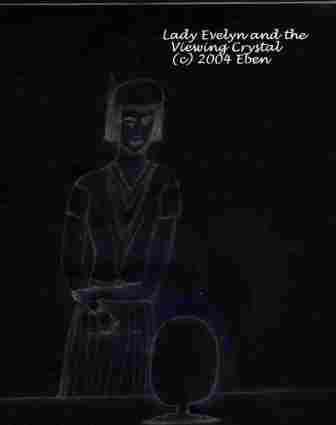
Lady Evelyn was so startled she nearly dropped the crystal. This time she stared into another woman’s face. The instant impression was a queen of Ancient Egypt, with a difference. What was it?

Lady Evelyn had studied Egypt’s old gods well, and their pronounced theriomorphic features. This creature--though no non-human ears attached to her head--had a zoomorphic quality. The eyes struck her as strange--they were not altogether human, as far as she could tell!
Unintelligible noise came from the glass as the woman moved her lips. She sounded grotesque, like a gramophone, its turntable adjusted at too low a speed. Quickly, the pitch lightened and the sounds she made could be discerned, but Lady Evelyn could make out not a word. The woman continued speaking, her eyes fixed on Lady Evelyn’s as if she could see her, and the words soon began to approximate Old English, then Chaucerian, and finally on to where Lady Evelyn could make out what the queen, or whatever she was, said.
“Barbarian!” the regal woman hissed with small pegged teeth, the only flaw in her exquisite beauty. “You have assassinated a Dauphin prince! A prince born in the purple! Don’t think you will go unpunished.”
Lady Evelyn was not used to being addressed in such a manner. She couldn’t help protest immediately, forgetting she could not possibly be talking to a living person.
“I don’t know what you are talking about! You are mad! I saw no prince here! Only that monstrous thing up there Mr. Carter smashed.”
The queen’s lips compressed and she eyed Lady Evelyn for a long moment, exactly as a predator might scrutinize its chosen quarry. “Our coordinates are set. These archives will now be retrieved, since barbarians like you have broken into the facility.”
Lady Evelyn looked about astonished. “Archives? Whose?”
The queen in the glass shrugged. “Why should we tell you? If you don’t know, then your ignorance is beyond redemption. Now I am ending this interview.”
She started to turn away. Lady Evelyn also noticed the whirring box of little symbols had now stopped, every column registering the same symbol, a gold triangle with a circle of solid blue color in the middle. That moment, however, the first column started flashing.
“You cannot!” she protested to the queen.
The woman looked back over her shoulder. “What do you mean, I cannnot? You have nothing to do with our affairs. The archives are ours, we won’t allow anything else to be destroyed, and though it’s the last on the planet, we’re taking it away for safe-keeping.”
Lady Evelyn thought fast and furiously. The last on this planet? Then she must be somewhere off-planet... “Wait! You’re not Egyptian, are you?”
The woman turned back around, facing her inquisitor. She laughed. “‘Egyptian,’ what is that? Oh, you mean the place where we put archives? No, I’m not Egyptian. What an absurd idea.”
“Well, then, what are you? where are you?”
The woman’s face registered less than cool disdain for the first time. Her face colored in the cheekbones, and her skin seemed to ripple with emotion just as her orichalc pectoral rippled with ever-changing, gleaming colors and tiny sequential symbols of their own.
“How dare you!” she cried. “You have no right to demand knowledge from us, especially after destroying a royal prince. But since you will die with the knowledge, I’ll tell you! This is a city constructed underground on the planet you call Mars, the Red Planet. We have been here for some time, and now the last of us will be leaving. That is why I checked to see the disposition of the archives. It was thought important to leave some record of our title to the planet, in case we return. But now I see it is not to be. You savages have destroyed a prince of ours, and no doubt will wreck everything we left behind.”
It was Lady Evelyn’s turn to ripple with emotion. She quite forgot her now agonizing bone fracture. Her mind was thrown into confusion. What was she to think? Could this be a refugee from Earth? And what had been the civilization that could have produced her?
Her memory racing, she ransacked every possibility, and could only think of one.
“Atlantis?” she burst out. “Was your nation on earth, before you emigrated, the island and continent called Atlantis?”
The women, for the first time, seemed to identify with Lady Evelyn’s humanity. She approached the glass so closely her non-human eyes filled the screen.
“Say it!”
“Say what?”
“‘Atlantis’! Say that word to me, slowly, several times. I must hear you speak it. I must!”
Baffled, Lady Evelyn complied. As she repeated the word, the magnificent, cold, jewel-like eyes softened, filling with longing and unspeakable sadness and loss.
Lady Evelyn was still saying the word when a scream nearly shattered the glass in her hand.
“Stop! You are killing me!” the woman’s voice swept out from glass and filled the chamber. She threw back her head, exposing her throat. The howling wail--too wolfish to be mistaken for anything human--nearly froze Lady Evelyn’s blood. For all she appeared to be, this had never been one of her own species! Even Theodore Davis called out, wondering what was going on.
Suddenly, the blue-flashing column transferred to the prisms, and one by one they flashed and rose in the air, lining up like dominoes, only flying in line toward the ceiling. The viewing glass darkened in Lady Evelyn’s hand.
“No!” Lady Evelyn cried out, though not really knowing what was happening.
Dozens of the prisms were now lifting off the basalt tables, all heading toward the ceiling.
Aghast, Lady Evelyn watched as they flared even brighter as they reached the ceiling, which at that moment opened at a tap from the first prism, roaring with released pressure, blowing hot air and dust into the chamber.
The prisms, never pausing, slipped into the newly opened shaft above, and behind them row on row of siblings continued to line up. Dozens quickly became hundreds, then thousands, as the prisms flew up and out of the chamber.
“What is happening?” Theodore Davis called out weakly, struggling to his feet.
Lady Evelyn threw down the viewing glass and rushed toward him.
In seconds the huge repository was emptied of the prisms. As for the other artifacts, they were not forgotten. Lady Evelyn and Theodore Davis smelled something burning. They couldn’t make out what was happening. Beautiful red, rose-like flowers, born of fire, bloomed here and there in the darkness. Then they realized what had happened as the roses faded just as quickly as they had appeared. What was left had now burnt up. Even the prince’s consort, entombed in the ceiling, had not been spared. An explosion and a brief flare of blue light issued from cracks in the stone.
There was a booming series of more concussions. Ceiling blocks slid back into place all the way to a point near the surface, closing off the escape hatch. But there was something even worse going on, where the two crystal beings had been withdrawn earlier after Carter’s attack. Lady Evelyn knew exactly what the sound meant. There was no time to scream as a ballast chamber in the ceiling was released, letting down untold tons of sand, dirt and rubble.
A plume of dust puffed from the edge of the Sphinx. It sprayed into the air at precisely 6:32 a.m. on the Friday morning the Vickers Vimy flown by four Britons passed at about 1,000 feet over Giza on way to Damascus, Syria.
Dust spewed from the fresh graves of Theodore Davis and Lord Carnarvon’s intrepid daughter was hardly perceptible in a scene where the whole shimmering atmosphere of dawn on the desert engulfed the darkened colossi of the three Great Pyramids. Quickly, the African Sun won the contest between light and dark. It lighted Egypt’s Wonders of the World degree by degree while the huge, drowsy hive of the Arab New York City nearby began to stir in earnest.
As solar might and splendor increasingly gained against the darkness and the gloom, the 1919 bomber requisitioned for the Great London-to-Australia Air Derby of 1924 caught the Sun’s rays and turned a dusky gold color. That was most misleading a hue. The fabric on fuselage and wings was a solid black except where its contest insignia, G-EAOU, was painted in bold white letters. “G-EAOU”? Word went round at the start of the 11,000 aerial odyssey in Houndslow. Some wag suggested the Aussie entry’s registration lettering, based on anyone’s chances of finishing the epic flight, had to translate as “God ‘elp all of us!” Naturally, many laughed, thinking it a joke. Others--veteran fliers knowing some of them would not survive the contest and see who won the big prize money--thought it quite appropriate.
But there was something different about this particular Egyptian dawn. Something radiated pulsing waves of energy between the dust plume and the aircraft--an intense blue glow, massed, then dissolving rapidly into a series of rapidly climbing incandescent flares.
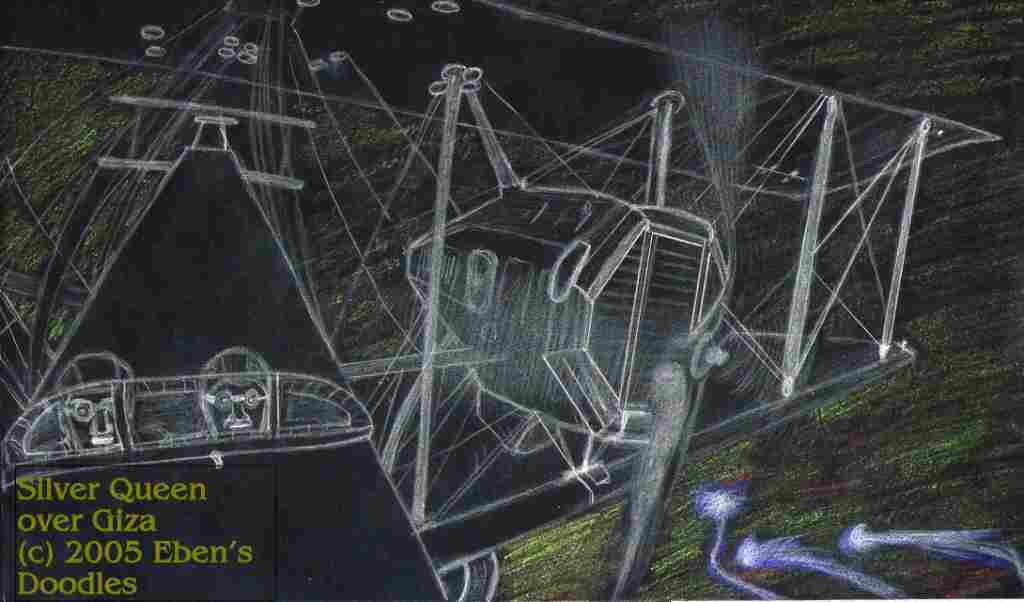
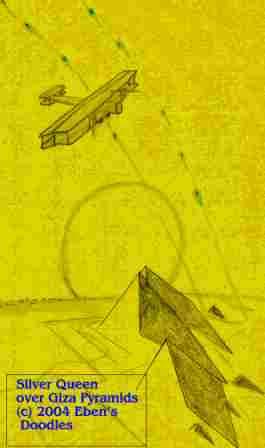
Suddenly, instead of diving out of control, the disabled aeroplane lurched upwards, at such great speed the wings, fore and aft, tore completely off. Like a rocket it sped. The black fuselage containing terrified fliers burst upwards into the upper atmosphere in a matter of seconds. Whether they knew it or not (and very soon they were too frozen to know anything), they had been given a one-way fare to the Red Planet.




